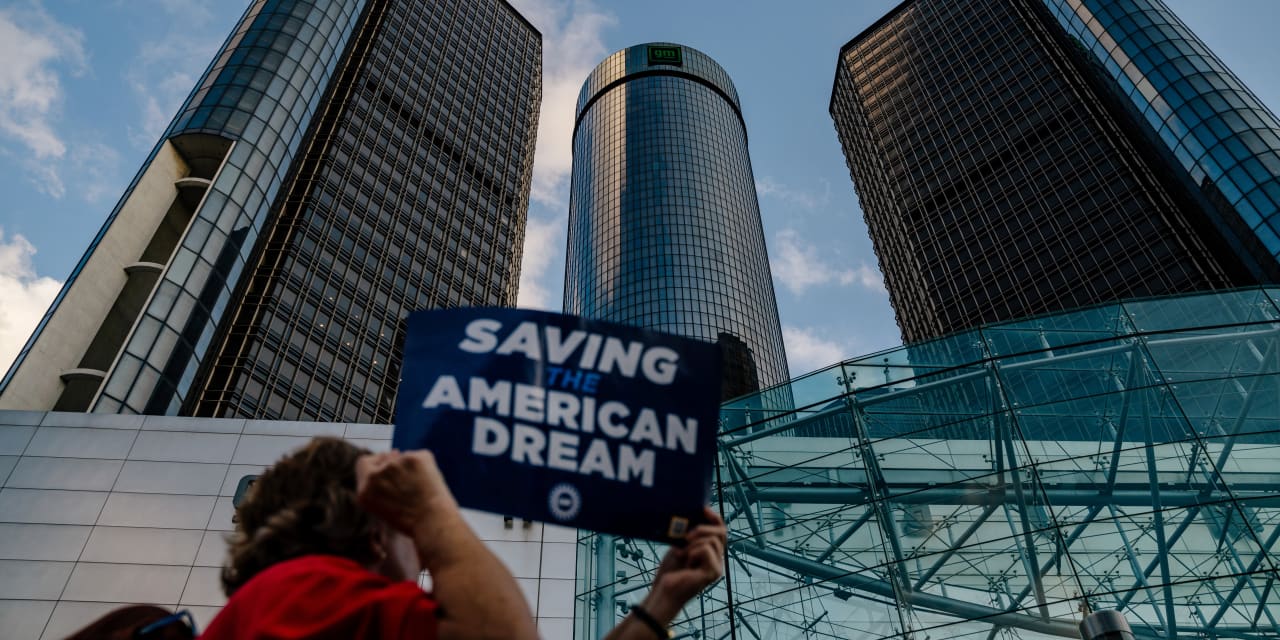United Auto Workers President Shawn Fain rejected a 21% pay increase from
Stellantis
as nearly 1,300 auto workers continued their third day of picketing outside three plants in Michigan, Missouri, and Ohio on Sunday.
Fain told CBS’s Face the Nation that Stellantis’ offer, made public by the maker of Chrysler and other brands on Saturday, was “definitely a no go.”
Fain told interviewers on the Sunday talk shows that auto workers have been left out of the industry’s record profit. The strike threatens to stretch on as the two sides remain apart, though the UAW met with
General Motors
on Sunday.
“This is about working class people standing up to get their share of economic justice and social justice after being left behind for decades,” Fain told MSNBC’s The Sunday Show.
Fain has pointed to 40% pay raises for auto maker CEOs over the past four years at Ford Motor (ticker: F), General Motors (GM), and Stellantis (STLA) as a reason the workers should also get pay boosts.
Fain told CBS that “If we don’t get better offers and we don’t get down and take care of the members’ needs, then we’re going to amp this thing up even more.”
Stellantis, announcing its offer, said: “Our goal is to secure a sustainable future that provides all our UAW-represented employees with an opportunity to thrive in a company that will be competitive during the automotive industry’s historic transformation. “
The pay disparity issue is resonating with some in Washington. Rep. Nancy Pelosi (D., Calif.), the former House Speaker, told MSNBC that CEOs making more in one month than what some workers make in a lifetime is “just unjust. Those profits that they say they are rewarding would not happen without the workers.”
Sen. Bernie Sanders (I., Vt.) said that while the head of General Motors makes $29 million a year, a newly hired worker at GM makes less than $17 an hour under a tiered wage system. “What you’re seeing in the automobile industry is what we’re seeing all over this economy: Greed on the top, suffering on the part of the working class, and people are tired of it,” he told CNN.
A GM spokesperson declined to comment on compensation, but confirmed that the company had met with the UAW this weekend.
Former Vice President Mike Pence told CNN’s State of the Union the Biden administration’s push to encourage electric vehicles is causing anxiety among auto workers. On pay disparities between auto company CEOs and rank-and-file union workers, the Republican presidential candidate said the issue should be left up to shareholders.
“I fully support how these publicly traded companies operate. I’m not interested in government mandates or government bullying when it comes to those kinds of issues,” Pence said.
Workers are on strike at General Motors’ Wentzville Assembly in Missouri, Stellantis’ Jeep assembly complex in Toledo, Ohio, and select departments in Ford’s assembly plant near Detroit.
The UAW initially sought a 40% increase in wages over four years, along with cost of living adjustments, a 32-hour workweek, and medical benefits for retirees. The auto makers have offered a 20% wage increase, plus other benefits that differ by company.
Fain disputed projections by some analysts that a prolonged labor strike could raise auto prices for consumers, saying: “Labor costs 5% of the cost of making a vehicle. These companies could double our wages and not raise the price of cars, and they would still make billions in profits.”
He said automakers have made a quarter of a trillion dollars over the last decade, including $21 billion in the first six months of this year, while workers are still making 2007 wages.
Rep. Debbie Dingell (D., Mich.) told CBS’s Face the Nation that the UAW’s contract negotiations are “going to determine the future of the auto industry in Michigan.”
House Minority Leader Hakeem Jeffries (D., N.Y.) told ABC’s This Week he would head to Detroit on Sunday to express solidarity in person with striking workers. “I stand with them,” he said, adding he hoped the strike ends sooner rather than later.
Write to Janet H. Cho at janet.cho@dowjones.com
Read the full article here











Leave a Reply